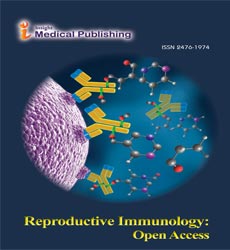T-cell based immunotherapy for melanoma and understanding how TLR/IL-1 receptor-associated kinase (IRAK) signal pathway in cancer contributes to cancer progression and chemotherapy resistance.
Geng D
DOI10.21767/2476-1974.100026
Degui Geng*
Department of Microbiology and Immunology, University of Maryland School of Medicine, USA
- Corresponding Author:
- Geng D
Department of Microbiology and Immunology, University of Maryland School of Medicine, USA
Tel: (410)706-5045
E-mail: dggeng@hotmail.com
Received Date: December 12, 2016; Accepted Date: December 13, 2016; Published Date: December 15, 2016
Citation: Geng D (2016) T-cell Based Immunotherapy for Melanoma and Understanding How TLR/IL-1 Receptor-Associated Kinase (IRAK) Signal Pathway in Cancer Contributes to Cancer Progression and Chemotherapy Resistance. Reproductive Immunol Open Acc 1:26. doi: 10.4172/2476-1974.100026
Copyright: © 2016 Geng D. This is an open-access article distributed under the terms of the Creative Commons Attribution License, which permits unrestricted use, distribution, and reproduction in any medium, provided the original author and source are credited.
Editorial
Melanoma is the deadliest skin cancer, and is notorious for its resistance to chemotherapy and radiotherapy. Dr. Geng has been using genetically engineered T cells to express tumour-reactive T cell receptors (TCR) as an immunotherapeutic approach for treating melanoma. However, a challenge for the efficacy of Tcell- based immunotherapy is that cancer cells express subdominant tumour antigens (TAgs). Dr. Geng’s research indicated that stimulating Toll-like receptors (TLRs) directly on tumor reactive T cells reduces the activation threshold to poorly immunogenic TAgs. TLR2-stimulated CD8 T cells derived from Tcell receptor transgenic pmel mice responded to suboptimal levels of weakly immunogenic TAgs. Pmel CD8 T cells treated with TLR2 ligand displayed significantly increased proliferation, cytokine production, and cytolytic activity. Treatment with pmel T cells plus purified TLR2 ligand showed increased antitumor activity in mice against an established melanoma tumor. Also, TLR2 stimulation on CD8 T cells from melanoma patients decreased the activation threshold to TAgs and resulted in augmented production of various effector molecules and cytolytic activity [1].
However, TLR ligands have the limited efficacy in cancer therapy due to the very short half- life in vivo. Therefore, Dr. Geng genetically engineered human T cells to express the MART-1 TCR, a T-cell receptor that recognizes the melanoma antigen MART-127-35, and to deliver the TLR5 ligand flagellin to tumor sites. Engineered T cells expressing the TCR along with flagellin showed greater proliferation, increased cytokine production and cytolytic activity against melanoma cells. In a xenogenetic mouse model of melanoma, mice treated with engineered human T cells showed tumor regression and prolonged survival [2]. Dr. Geng concludes that tumor-reactive Tcells capable of secreting TLR5 ligand generate potent and longlived antitumor activity by: (1) delivering a TLR agonist directly to the tumor site, (2) co-stimulating T-cell responses (cytokines, expansion, and cytolytic activity), (3) inducing the production of chemokines by melanoma cells, (4) recruiting other immune cells to the tumor site, (5) reducing CD11 (+) Gr1 (+) myeloidderived suppressor cells.
TLRs are not only expressed by immune cells but also by various tumours including melanoma, however it is still unclear whether they play a role in cancer cells. Dr. Geng and his colleagues firstly investigated the protein expression levels of TLRs and TLR-related proteins including the TLR/IL-1 receptorassociated kinases (IRAK) in melanoma cell lines and melanoma tumor biopsies. The results showed that among them, highly activated phospho-IRAK-1 and phospho-IRAK-4 were expressed in the absence of TLR stimulation. Inhibiting IRAK-1,-4 signalling in melanoma cells with the pharmacologic inhibitor induced apoptosis in vitro in combination with a chemotherapy drug vinblastine. In a xenograft model, the combined pharmacologic treatment delayed tumor growth in mice bearing an established melanoma and prolonged mouse survival [3]. Dr. Geng proposes IRAK-4 as a novel promising cancer therapeutic target to enhance chemotherapy. Dr. Geng’s current research work will significantly reduce mortality and improve the quality of life for patients suffering from cancer.
References
- Geng D, Zheng L, Srivastava R, Velasco-Gonzalez C, Riker A, et al. (2010) Amplifying TLR-MyD88 signals within tumor-specific T cells enhances antitumor activity to suboptimal levels of weakly immunogenic tumor antigens. Cancer Research 70: 7442-54.
- Geng D, Kaczanowska S, Tsai A, Younger K, Ochoa A, et al. (2015) TLR5 ligand-secreting T cells reshape the tumor microenvironment and enhance antitumor activity. Cancer Research 75: 1959-71.
- Srivastava R, Geng D, Liu Y, Zheng L, Li Z, et al. (2012) Augmentation of therapeutic responses in melanoma by inhibition of IRAK-1,-4. Cancer Research 72: 6209-16.
Open Access Journals
- Aquaculture & Veterinary Science
- Chemistry & Chemical Sciences
- Clinical Sciences
- Engineering
- General Science
- Genetics & Molecular Biology
- Health Care & Nursing
- Immunology & Microbiology
- Materials Science
- Mathematics & Physics
- Medical Sciences
- Neurology & Psychiatry
- Oncology & Cancer Science
- Pharmaceutical Sciences
